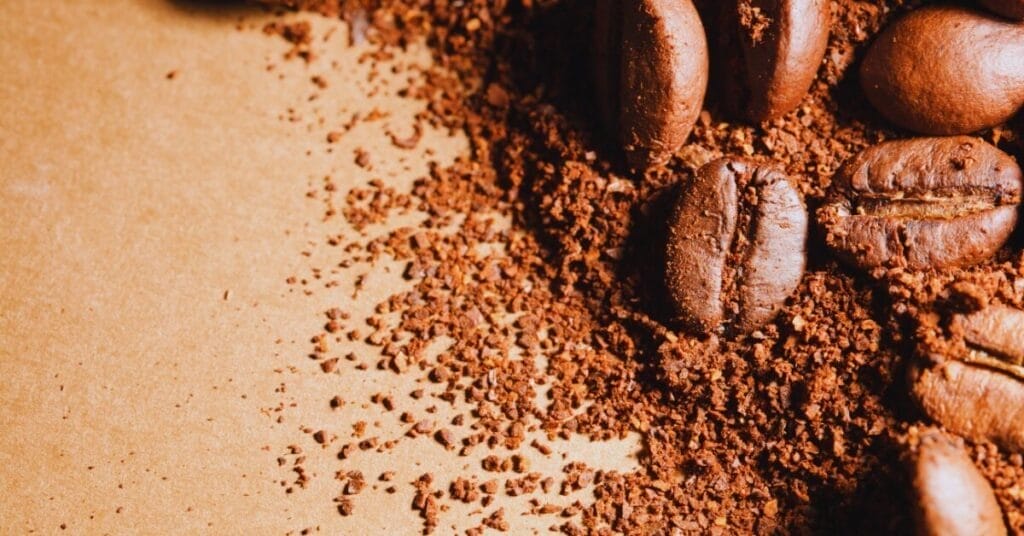Welcome to the brewing debate on whether “Should Ground Coffee Beans Be Kept in the Fridge .”
Many coffee enthusiasts grapple with the decision of optimizing freshness versus potential drawbacks.
When it comes to preserving the rich flavors of your favorite brew, the question arises: Is refrigeration the secret to extending the life of your ground coffee?
Advocates argue that keeping ground coffee in the fridge not only prolongs freshness but also shields it from external influences. However, skeptics raise concerns about moisture, flavor absorption, and potential compromises in aroma.
This discussion delves into the pros and cons of refrigerating ground coffee, examining its impact on taste, longevity, and overall quality.
Join us as we navigate the complexities of coffee storage, evaluating whether “Should Ground Coffee Beans Be Kept in the Fridge” is a beneficial practice for your daily coffee ritual.
As an affiliate site, we are associated with the amazon. We might receive a commission when you use links or recommendations on our website to make qualified purchases. The cost you pay for the goods or services is unaffected by this.
Table of Contents
Should Ground Coffee Beans Be Kept in the Fridge || 7 Keys to Storage Coffee Beans

In this informative guide, we address whether ground coffee beans should be stored in the fridge.
Here are 7 key tips to safely store your coffee beans:
1. Airtight Containers
The most common coffee container found in stores is the vacuum-sealed original packaging.
The level of excellence in coffee storage is exemplified by this airtight sealed bag of coffee.
Hence, it is highly recommended to imitate this standard by using containers with a similar airtight seal.
Whether you use a bag, canister, or mason jar, ensure a tight seal for your coffee grounds.
2. Cool and Dark Location
An opaque, airtight container, like the one mentioned, is ideal for storing coffee.
Alternatively, if the original coffee bag has a zip-top seal, it can be used too. Before sealing the bag, remove any extra air.
For optimal storage, keep coffee bags in a cool, dark, and dry space, such as a kitchen cabinet.
3. Avoid Freezing Ground Coffee Beans
To maintain the freshness of coffee ground beans, it’s crucial to avoid storing them in high-moisture areas, and the refrigerator is among the dampest spots in your kitchen.
Excess humidity can lead to moisture evaporation from the grounds, resulting in stale-tasting coffee.
4. Use Freshly Ground Coffee Beans
For optimal coffee freshness, it’s crucial to consider both the expiration date and the roast date mentioned on the packaging.
While the expiration date marks the point of no return, it’s advisable to use and consume the coffee within three to four weeks from its roast date, even if it’s earlier than the expiration date. This practice guarantees the most delightful coffee experience.
5. Discard the original packaging.
When storing coffee, it’s advisable to remove it from the original packaging, as it may not be airtight.
Transferring the coffee to a sealed container ensures better preservation and maintains its freshness for a longer period of time.
6. Consistent Temperature
Coffee drinkers should aim to store coffee grounds in a moisture-free environment.
Keeping ground coffee at room temperature in a dry location provides a decent shelf life. Using a sealed container can extend this period further.
The freezer and cabinets are suitable options, but it’s best to avoid the refrigerator for coffee storage.
7. Use Within a Few Weeks
To enjoy the best flavor and aroma, it’s recommended to use your coffee within a few weeks of the roast date.
Freshness diminishes over time, so consuming the coffee sooner ensures a more delightful coffee experience.
Should Ground Coffee Beans Be Kept in the Fridge || Pros and Cons

When pondering the ideal storage solution for your ground coffee beans, the question often arises: Should ground coffee beans be kept in the fridge?
Let’s explore the pros and cons of refrigerating your coffee to help you make an informed decision.
Pros
1. Extended Freshness
Storing ground coffee in the fridge can extend its freshness due to the cooler temperature, preserving the flavors and aromas for a longer period of time.
2. Protection Against Odors
The fridge acts as a barrier against absorbing unwanted odors, ensuring that your coffee maintains its original taste without picking up any extraneous scents.
3. Prevention of Flavor Loss
Refrigeration slows down the oxidation process, reducing the loss of flavors and ensuring a more robust and flavorful cup of coffee over time.
4. Temperature Stability
The stable and consistent temperature inside the fridge prevents rapid deterioration, helping to maintain the quality of your ground coffee beans.
5. Ideal for Bulk Storage
If you buy coffee in larger quantities, the fridge can be a convenient space to store excess ground coffee without compromising its freshness.
6. Reduced Exposure to Light
Refrigerators provide a dark and cool environment, minimizing exposure to light, which can degrade the quality of coffee beans.
Cons
1. Moisture Concerns
The fridge can introduce moisture, which is detrimental to coffee. Moisture compromises the beans’ integrity, leading to clumping and potential flavor alteration.
2. Flavor Absorption
While the fridge protects against external odors, coffee beans can absorb flavors from other items in the fridge, impacting the taste of your brew.
3. Condensation Issues
Rapid temperature changes, such as when removing coffee from the fridge, can cause condensation on the beans, further contributing to moisture-related problems.
4. Loss of Aroma
The cold temperatures of the fridge may dull the aromatic compounds in coffee, affecting the overall sensory experience of the brewed coffee.
5. Potential for Freezer Burn
If not stored properly, coffee in the freezer compartment of the fridge may be susceptible to freezer burn, compromising both flavor and freshness.
6. Inconvenience
Frequent temperature fluctuations when opening and closing the fridge can expose coffee to varying conditions, potentially accelerating its degradation.
In the debate over whether ground coffee beans should be kept in the fridge, it’s essential to weigh the pros and cons.
While refrigeration can extend freshness, the risk of moisture and flavor absorption suggests that alternative storage methods might be more suitable for preserving the integrity of your beloved coffee beans.
Choose a storage approach that aligns with your preferences and brewing habits, ensuring a consistently delightful coffee experience.
Factors Affecting Coffee Freshness || Hidden Facts

Maintaining optimal coffee freshness involves considering various factors that influence the flavor, aroma, and overall quality of your brew.
When contemplating whether “should ground coffee beans be kept in the fridge,” it’s essential to understand these key elements:
1. Air Exposure
Exposure to air accelerates the oxidation process in ground coffee, leading to staleness. Sealing coffee in airtight containers mitigates air exposure, irrespective of refrigeration.
2. Temperature
The debate over refrigeration revolves around temperature.
While cooler temperatures can slow down oxidation, excessively cold conditions in the fridge may compromise the aromatic compounds of coffee. Striking a balance is crucial.
3. Light
Exposure to light, especially sunlight, can degrade coffee quality.
Storing ground coffee in opaque, airtight containers protects it from harmful light exposure, eliminating the need for refrigeration to some extent.
4. Humidity
Moisture is a double-edged sword. While excessive humidity can lead to clumping and flavor degradation, overly dry conditions may result in desiccation.
The fridge’s controlled humidity may impact this delicate balance.
5. Container Material
The choice of storage container matters. Opt for materials like glass or ceramic that won’t absorb or impart odors, ensuring the integrity of your coffee’s flavor profile.
6. Roast Level
Lighter roasts tend to degrade more quickly than darker roasts. Understanding your coffee’s roast level helps determine its optimal storage conditions.
7. Freshness of Beans
Ground coffee is more susceptible to losing freshness than whole beans. Grinding just before brewing minimizes surface area exposure, preserving the volatile compounds responsible for flavor.
8. Frequency of Use
If you consume coffee regularly, storing it in a cool, dark place may suffice. For long-term storage, considering refrigeration or alternative methods becomes crucial.
While the question of “Should Ground Coffee Beans Be Kept in the Fridge” is multifaceted, understanding the various factors affecting coffee freshness allows for informed decisions.
Tailoring storage methods to mitigate the impact of air, light, temperature, and humidity ensures that your ground coffee maintains its peak flavor for a delightful brewing experience.
How long will coffee beans survive at room temperature || Survival Score

Coffee beans can last for several weeks to a few months at room temperature, depending on various factors such as the roast date, packaging, and storage conditions.
Generally, whole coffee beans maintain their freshness and flavor for about 2 to 4 weeks when stored in a cool, dark, and dry place, away from direct sunlight and heat sources.
However, it’s essential to consider the beans’ roast date and use them within this time frame to ensure the best taste experience.
Which Container Is Best for Storing Coffee Beans || Container type

Opaque, airtight containers are indeed the best choice for storing coffee. However, for coffee enthusiasts seeking to preserve the coffee’s aromas, non-absorbent materials like metal and ceramic containers are highly recommended.
Glass containers are a suitable alternative. While plastic containers are not ideal for long-term storage, they can work if the coffee is used within two weeks.
Opting for the right material ensures the best retention of coffee’s delightful flavors and aromas.
FAQs || Should Ground Coffee Beans Be Kept in the Fridge
What is the best way to store ground coffee?
Store ground coffee in an airtight container in a cool, dark place, away from moisture and temperature fluctuations, to maintain optimal freshness.
Do ground coffee beans need to be refrigerated?
Refrigerating ground coffee beans is not necessary; storing them in an airtight container in a cool, dark place is preferable to maintain freshness.
Should you refrigerate ground coffee after opening?
Refrigerating ground coffee after opening is not recommended, as it can introduce moisture and compromise the flavor; store it in an airtight container in a cool, dark place instead.
Does ground coffee go bad in the refrigerator?
Refrigerating ground coffee can lead to moisture absorption and flavor degradation, potentially causing it to go bad; storing it in a cool, dark place is preferable.
Conclusion
In the intricate tapestry of preserving coffee freshness, the debate over “Should Ground Coffee Beans Be Kept in the Fridge” unveils a nuanced landscape.
Balancing factors like air exposure, temperature, and humidity is pivotal for sustaining the rich flavors of ground coffee.
Considering individual preferences and brewing habits is essential, as is the awareness that storing coffee is not a one-size-fits-all approach. Whether exploring refrigeration or alternative methods, the aim is to maintain peak quality.
As this discussion dissolves into considerations, remember that optimal storage embraces a holistic approach, ensuring each cup brewed from those ground coffee beans is a flavorful delight.







